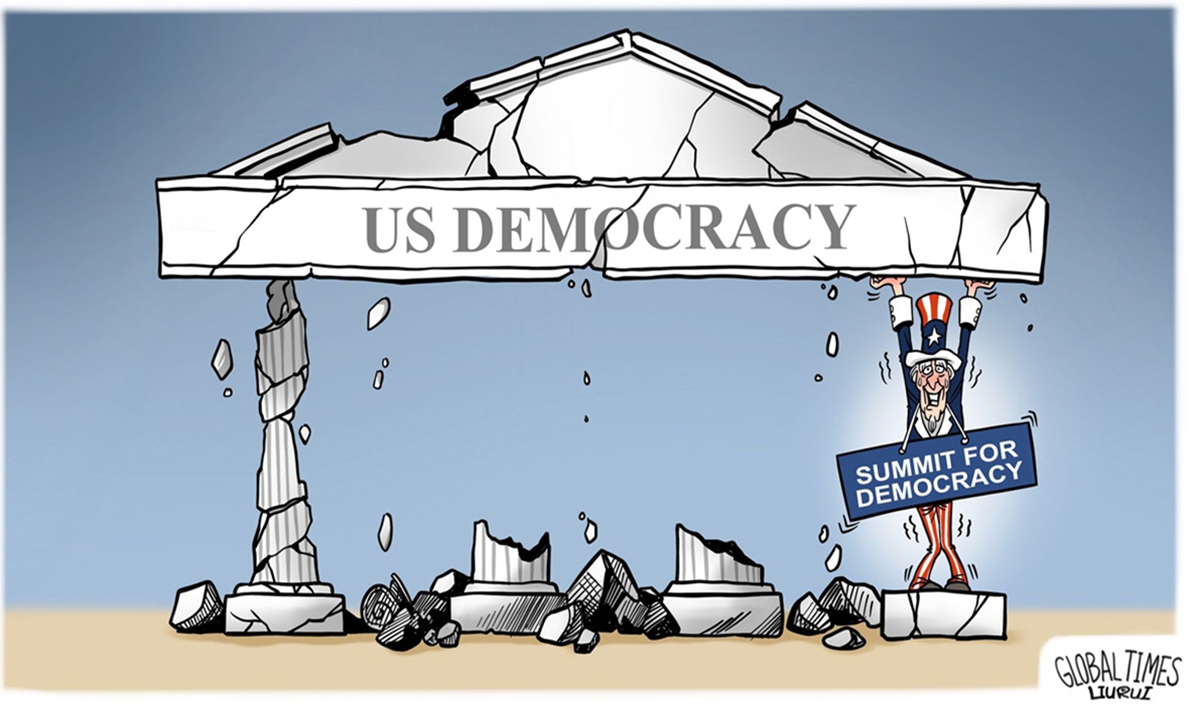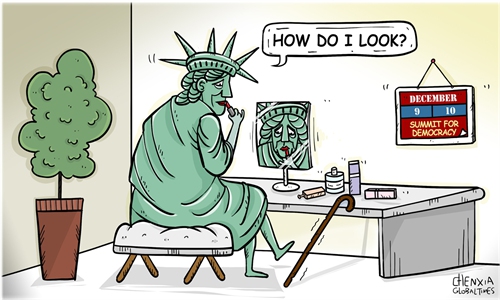
Crumbling democracy Illustration: Liu Rui/GT
As the US convenes its much-touted yet highly controversial "summit for democracy," a debate is heating up about the meaning of democracy, the challenges it faces and the US' democratic backsliding.
Democracy is a common value of humanity. Commitment to democracy means facing up to such perennial challenges as economic inequality and political polarization. It is unfortunate that, instead of countering these common threats, the US has focused on countering China, portraying China as an enemy to American democracy when it could in fact be the US' greatest partner in addressing global challenges. Such poor judgment would only drive the world into greater division. It is time that people wake up to the consequences caused by the US' "crusade for democracy."
Contrary to the myth that the US model of democracy delivers economic and social progress, many countries that remade their system in the image of the US were worse off, ending up even poorer or embroiled in instability or conflict. In contrast, countries such as China that embarked on their own paths of democracy have built prosperous and vibrant societies.
The US model of democracy is not a panacea for all development woes. After all, democracy must take its roots in the people, whose livelihoods are the foundation of democracy, whatever form it takes.
It is a shame that the US government cares not about the people and their livelihood, but only about grandstanding. The country is now a place where the rich and powerful rave about democracy, while people at the lower rungs of the economic ladder struggle to get by.
With inflation soaring, millions being plunged into poverty, and thousands dying from COVID-19 every day in the US, what American leaders should be organizing is not a "summit for democracy" but a "summit for livelihood." Nothing rings hollower than privileged elites talking about democracy when people can hardly pay their bills and put food on the table.
Unfortunately, the plight of its people has never gained enough attention from a government which invests most of its energy in attacking others, especially China and Russia. If anything, such attacks have served as a convenient distraction from US governance failure.
A recent Robert Bosch Foundation poll suggests that more than 80 percent of American respondents see their politicians as puppets of money. For the 2020 presidential elections, the Democrats spent a jaw-dropping $6.8 billion and the Republicans no less than $3.8 billion. Ordinary Americans are eligible for running for public offices, too, but only in theory. It is simply impossible for the ordinary Joe to afford the staggering cost.
"One man, one vote" in the US may seem tempting on paper, but once voters are done with casting their ballots, whoever wins the election gets to wield all the power, and there is no effective way to hold them to the promises made on the campaign trail.
No form of democracy is perfect, and no country should claim its own system to be superior to others. However, the US had tried repeatedly to impose its brand of democracy on developing countries. Democratic transplantation has left Iraq, Syria and Afghanistan in devastation and their people in misery.
It is hardly a coincidence that the "summit for democracy" is being held on the 30th anniversary of the Soviet Union's collapse. The so-called "victor" in the Cold War may still see itself as the provider of global stability and protector of democratic peace. But three decades on, countries are losing interest in jumping on the bandwagon of a hegemon for the illusory promise of peace. They have come to realize that US democracy does not provide global peace, and that development and people's livelihood are key indicators of democracy.
Worse still, despite China's repeated warnings, the US invited the Taiwan region to the "summit for democracy," a serious violation of its own commitment to the one-China principle and provocation to China's sovereignty. Ironically, on the same day of the event's opening, Nicaragua announced its decision to resume diplomatic relations with China - a slap in the face to those that play "the Taiwan card" under the banner of "democracy."
The author is a Beijing-based commentator.

